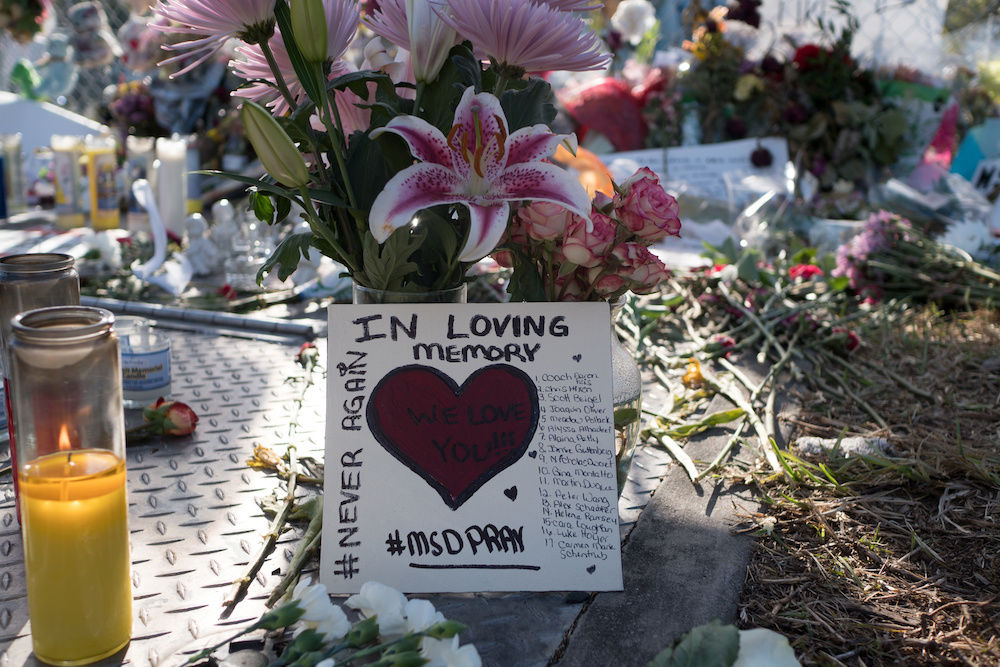Like all of you, I have been praying for our brothers and sisters in Parkland, Florida, in the aftermath of the mass shooting there.
It is so hard to understand this kind of violence and the hatred that motivates it. We ask how people can do such things, how does murder get into a person’s heart?
Our Christian faith tells us that we must overcome evil with good and respond to hatred with love. To trust in God’s providence, to rely on his mercy — it is hard to do. But this is our challenge in the days ahead.
Our more long-term task is to proclaim to our society a true understanding of death and the meaning of life.
I am struck by how confused and conflicted we are about death.
On the one hand, we seem afraid of death. We trivialize it, tell jokes about it, we try to pretend it is not real. On the other hand, we seem to glorify death in our culture — we watch people suffer and die for “entertainment” on television and in movies. We allow our children to play games that essentially involve them killing “virtual” people.
And all of that spills over into our society, which is awash in guns and violence, including the violence of abortion and euthanasia. It is a society where life often seems “cheap” or disposable, as our Holy Father continues to remind us.
We know that God did not make death. He is the Author of Life and the God of the living. He wants only life for his children. Death entered our world through our own human sinfulness.
But death does not have the final word in anyone’s life, because God’s love is stronger than death and Jesus Christ has conquered sin and destroyed death.
We need to remember that, especially in these troubled times. More than that, we need to remember that Jesus Christ — who died once and is alive now forever — walks with us on the journey that we call life.
We all know that beautiful psalm, “The Lord is my shepherd, I shall not want. … Even though I walk through the valley of the shadow of death, I fear no evil; because you are with me.”
Jesus goes with us along the path of life. There is nothing that we can experience — even the loneliness of suffering and death — that he has not experienced before us. He has descended into the depths of death and now he comes to guide us, to show us the way beyond death. We follow him in this life to live with him in the next.
I think we also need to recover the ancient practice known as “memento mori” (Latin for “Remember you must die”).
This practice has deep roots in our spiritual tradition. In Christian art, we often see saints depicted in prayer while on their desk or somewhere in the scene there is a skull — as a graphic reminder of our mortality.
And, of course, we have an echo of all this as we receive ashes at the beginning of Lent: “Remember that you are dust and to dust you shall return.”
Remembering that we will die helps us to keep life in perspective. What to hold on to, what to let go of. What is important, what is not. Making sure we value our relationships more than money and things.
What the Christian tradition calls the “art of dying well” (in Latin, “ars moriendi”) is really all about how to live with holiness and blessedness.
The reason our life matters — and the reason our death matters — is because each of us is created on purpose by the loving hand of the living God, made by him and for him.
And God made us for greater things! We are children of God and he is personally invested in our lives. He made each one of us for a beautiful purpose and he is committed to helping us to become the people we are meant to be.
That is why what we do in this life matters, because what we do shapes who we become. And in God’s plan he wants us to become like him, to be transfigured in the image of his Son, Jesus Christ.
We are made for transcendence, to live with joy in this world as we make our pilgrim way to the world that is to come — the kingdom of heaven, where we will have life that shares forever in the life of God.
This is what is missing in our culture’s understanding. Death is not a wall but a door; not an ending but a beginning. We are born to die. Yes. But we die in order to be raised.
Pray for me this week and I am praying for you.
Let us turn to our Blessed Mother Mary and ask her to be with our brothers and sisters in Parkland. May she bring healing to them and peace to our troubled society.
You can follow Archbishop Gomez daily via Facebook, Twitter and Instagram.

